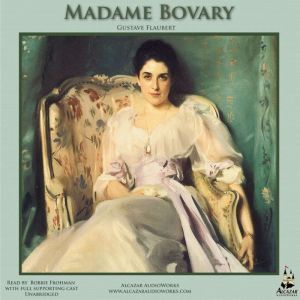

Madame Bovary
Author: Gustave Flaubert
Narrator: Bobbie Frohman, various narrators
Unabridged: 12 hr 23 min
Format: Digital Audiobook Download
Publisher: Alcazar AudioWorks
Published: 02/20/2014


Author: Gustave Flaubert
Narrator: Bobbie Frohman, various narrators
Unabridged: 12 hr 23 min
Format: Digital Audiobook Download
Publisher: Alcazar AudioWorks
Published: 02/20/2014
Gustave Flaubert (1821–1880), French novelist and one of the masters of nineteenth-century fiction, was born in Rouen, the second son of a noted physician. Beset by ill health and personal misfortune, he led a solitary life of rigid discipline, which was reflected in his writing by his obsession with finding le mot juste (exactly the right word). His first published novel was Madame Bovary (1857). When certain passages in Madame Bovarywere judged to be offensive to public morals, Flaubert, his publisher, and his printer were tried but acquitted.
Bobbie Frohman, a third generation Californian, was raised in a large extended family, the niece of cowboys. Early on she developed a deep love of animals, training her dogs to perform with her at dog shows, and as a competitive barrel racer with her beloved horse, Lucky.
Oh, Emma. Emma, Emma, Emma. Darling, why must you make it so easy ? No, dear, (for once) I don’t mean for the men. I mean for everyone else in the world who goes into this book just looking for an excuse to make fun of you. I would say that most people don’t know that much about France, but they do......more
welcome to...MADAME BOVUARY! you know what time it is — it's a title / month pun, i'm picking up an ill-advised classic, and i'm going to be as attention seeking about it as possible. IT'S ANOTHER PROJECT LONG CLASSIC INSTALLMENT. except this time i'm doing it at the end of one month into the start of......more
Madame Bovary is a gorgeous comedy of manners… The narration is flowery and almost baroque… There is no sympathy for the characters… The snide style of the novel is unique. Gustave Flaubert begins from afar… From the school years of Charles Bovary – the future doctor and subsequent husband of Emma Bo......more
“Madame Bovary is like the railroad stations erected in its epoch: graceful, even floral, but cast of iron.” New York Times Book Review
“Madame Bovary has a perfection that not only stamps it, but that makes it stand almost alone; it holds itself with such a supreme unapproachable assurance as both excites and defies judgment.” Henry James
“Flaubert established for good or ill, what most readers think of as modern realist narration, and his influence is almost too familiar to be visible.” James Wood, New York Times bestselling author of How Fiction Works
“It still astonishes. If one were to ask, ‘World, which is the most perfect novel ever written?’ the world would immediately answer: Madame Bovary.” Washington Post Book World
“A masterpiece of realism.” Masterpieces of World Literature